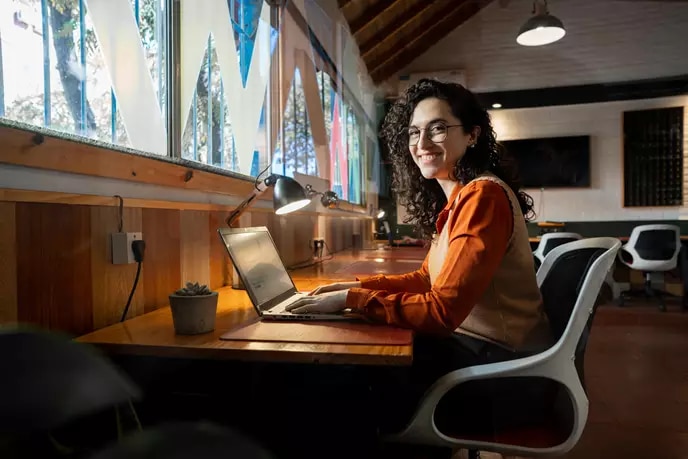
The Modern Workspace Is About Choice
Coworking spaces have become the go-to solution for professionals seeking workspace flexibility, transforming from a niche working model into a mainstream alternative that now rivals traditional office leases.
But spend a few minutes on a coworking website and you’ll quickly notice two membership options: hot desking or a dedicated desk.
While both options exist under the same coworking roof, they represent vastly different philosophies about how we work, where we belong, and what we need to feel productive.
The choice often comes down to work style, costs, collaboration opportunities and workspace ownership that extend far beyond simple desk preferences.
In this article, we will explore why understanding the difference between a hot desk and dedicated desk matters, helping you decide once and for all which coworking option is right for you.
What Is a Hot Desk?
Most professionals are familiar with the concept of hot desking in traditional offices, stripping away assigned seating and choosing your desk for the day on a first-come, first-served basis.
In the coworking environment, this means you arrive each day without a predetermined spot, choosing from whatever desks happen to be available. This flexible access ensures that all coworking members enjoy the same resources as they need.
Most coworking spaces structure hot desking around day passes or monthly memberships, which make them appealing to freelancers and small teams operating on a tight budget. They are also ideal for businesses with a hybrid work model where employees only need to work in the office occasionally, whether it’s once a week or only a few times a month for important meetings.
Another benefit of hot desking is the ample networking opportunities it presents professionals, especially for freelancers and startups. The constant rotation of who you’re sitting next to or working near creates an environment where networking happens naturally, a powerful and easy way for businesses to find strategic partnerships and learn from skilled professionals they are surrounded by.
What Is a Dedicated Desk?
A dedicated desk or a fixed desk is a reserved, personal workspace in a shared office space, giving you access to the same, fixed workspace each day.
Rather than having to get to a shared office early and find an available desk, dedicated desks offer a consistent, permanent desk you can customise to suit you without worrying that someone else will use it.
Think of it like renting a specific spot within the larger coworking community. Like hot desking, a dedicated desk are typically offered on a monthly contract basis, making it ideal for those needing long term commitments without the high costs of traditional rentals.
This arrangement tends to work best for people who need a personal desk regularly, typically three or more days per week.
Remote employees who split time between home and office often find dedicated desks worth the extra cost because they eliminate daily setup time. The same goes for freelancers or small business owners who have established schedules or need reliable access to specific equipment.
Anyone who values routine over variety, or who has particular workspace requirements usually become dedicated desk users in a coworking space.
Hot Desk vs Dedicated Desk: Key Differences
The choice between hot desking and dedicated desks often comes down to how you work and what you value most in a workspace. While both exist within the same coworking environment, they create distinctly different experiences that can significantly impact your daily routine and productivity.
Ownership and Consistency
Dedicated desks offer you the privilege of settling into the same desk every day without scanning the room for options. Your workspace becomes genuinely familiar, from the exact angle of your monitor to knowing which neighbors prefer quiet mornings versus casual conversation.
Hot desking means embracing flexibility as part of your routine, where each day brings a different view and potentially different working conditions. Some find this flexi desk option stimulating, others may discover they are more productive when their environment remains constant.
Cost and Budgeting
Hot desks provide a more cost-effective option for budget-conscious freelancers or occasional remote workers as they typically cost significantly less than a dedicated desk membership.
For example, Servcorp offer hot desks starting from £127 per month, making it perfect for those that are happy to use any available desk in a shared office environment.
Dedicated desks command higher fees because you're essentially renting a specific piece of real estate within the space, regardless of whether you use it every day.
For frequent users, the higher cost for reserved space often balances out, but occasional visitors usually find hot desking more economical.
Work Style and Routine
Coworking spaces are prized for their ability to accommodate for all different working styles, making your tolerance for daily adaptation a key consideration for whether a hot desk or dedicated desk is best for you.
Digital nomads, freelancers, and remote workers are particularly inclined towards hot desking, either because they find inspiration in changing environments or don't spend enough time in the space.
Meanwhile, those who thrive having a structured work style and enjoy having personal space tend to prefer a dedicated workspace.
Storage, Privacy, and Personal Items
Since having a dedicated desk is basically the same as having your own desk, professionals can personalise their space to create their ideal workspace.
Besides the ability to leave behind personal items such as coffee mugs, chargers and notepads, the storage capability extends to sensitive documents or equipment that would be impractical to transport daily.
Meanwhile, with no assigned desks, hot desk users must take home their belongings each evening and often work without personal touches that make a space feel comfortable.
Privacy also differs significantly, as dedicated desk users develop familiarity with their neighbors and can somewhat predict noise levels or interruption patterns.
Collaboration Opportunities
Hot desking naturally increases your exposure to different people and projects, as you encounter new neighbors regularly. This constant rotation can lead to fresh perspectives, spontaneous collaborations, or business connections that might never happen with fixed seating.
Dedicated desk users often develop deeper relationships with their immediate neighbors, creating more consistent collaboration opportunities but potentially limiting exposure to the broader coworking community. The trade-off becomes depth versus breadth in professional networking.
Access to Amenities
Most coworking spaces provide equal access to shared amenities like high-speed Wi-Fi, kitchens, meeting rooms, and common areas regardless of desk type.
However, dedicated desk members sometimes receive priority booking for conference rooms or additional perks like extended access hours.
Hot deskers occasionally find themselves competing for resources during peak times, though this varies significantly between spaces. The amenities difference often comes down to the specific coworking space's membership structure rather than an inherent feature of either desk type.
Who Should Choose a Hot Desk?
Hot desking works particularly well for freelancers juggling multiple projects, digital nomads who embrace uncertainty as part of their lifestyle, and professionals who only need workspace for a few hours each day. The model makes financial sense when you're not using space consistently, offering reduced costs while providing access to the broader coworking community through constantly changing neighbors and unexpected conversations.
This setup thrives in collaborative environments where spontaneous interaction can lead to partnerships, project opportunities, or business connections that dedicated desk arrangements might never facilitate. The variety keeps things fresh, and the serendipity factor becomes part of the workspace experience rather than just an occasional bonus.
Browse these shared office spaces:
Who Should Choose a Dedicated Desk?
Dedicated desk users with stable routines or those who need a reserved spot for consistent client meetings, important calls, or equipment-heavy work find the reliability invaluable.
This option works particularly well for small teams who want to sit together regularly, creators who need specific lighting or ergonomic setups, and individuals with specialised equipment or sensitive files that would be impractical to transport daily.
The arrangement reduces friction from daily setup while promoting a sense of ownership and structure that some people need to feel productive.
When your workspace remains constant, you can focus on the work itself rather than adapting to new environments, making it ideal for those who thrive on routine or have specific accessibility requirements that benefit from consistency.
Making an Informed Decision: Hot Desk vs Dedicated Desk
The choice ultimately comes down to understanding your own needs and preferences.
Hot desking offers cost savings, variety, and networking opportunities but requires adaptability and daily setup. Dedicated desks provide consistency, storage, and personalization but cost more and limit your exposure to the broader community.
Consider your workspace requirements, work style, travel frequency, budget constraints, and whether your personality leans toward routine or variety.
These desk rentals represent just one piece of your broader office space and coworking strategy, especially as hybrid work continues to evolve.
Many spaces offer day passes or trial periods that let you experience both models before committing to a monthly membership. Start with the option that seems most aligned with your immediate needs but remember that your preferences might change as your work situation evolves or as you become more familiar with the coworking environment.
Final Take: Finding the Perfect Balance for Your Work Life
There's no one-size-fits-all answer when it comes to choosing between hot desks and dedicated workspaces.
The decision comes down to finding the perfect balance of flexibility and control that matches your specific situation, work demands, and personal preferences.
Whether you value the mobility and spontaneity of hot desking or need the stability of a dedicated workspace, both options serve legitimate purposes in today's diverse work landscape.
The goal isn't to find the objectively "best" option but to align your coworking environment with your professional flow and lifestyle requirements.
Your ideal workspace solution should support your productivity rather than create additional friction, and sometimes that means being honest about what you actually need versus what sounds appealing in theory.
Frequently Asked Questions






